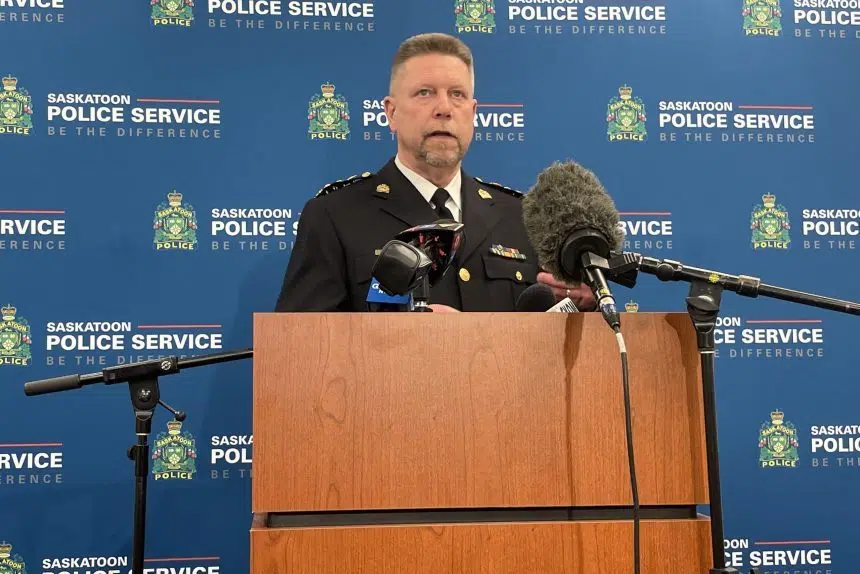Saskatoon’s chief of police still thinks decriminalization of drugs could be an ill-fitting approach for the city.
“I haven’t changed my mind,” Chief Troy Cooper said when asked if he still believes decriminalization might not be the best course of action.
That’s not because Cooper doesn’t support decriminalization. He said “de facto decriminalization” — or decriminalization without actual changes to the law — is already happening in Saskatoon.
In cases of simple drug possession, Cooper said prosecutors have been withdrawing or staying around 80 per cent of charges. Further, he said Saskatoon Police Service officers are not seeking out drug users specifically and, in many cases, decide not to pursue charges of simple possession in the first place.
“We have the option of alerting the Crown to the fact there’s a drug influence in the offence without actually having the criminal impact of those charges,” Cooper explained.
The chief said he feels formal decriminalization could limit officers’ discretion in cases that aren’t as simple as just drug possession.
De facto decriminalization involves relying on officer discretion which, Cooper admitted, can be inconsistent in its application. Consistency would be more surely achieved through a federal change in legislation, he added.
In cases where drugs are involved but the alleged offence goes beyond an individual simply using drugs themselves, Cooper said that fact is “quite clear” to officers. Cases involving trafficking and more serious criminal behaviour are quickly spotted by officers, he said, but it leaves them with the question of how to respond.
Cooper said officers are often limited to either laying a charge or not.
“I don’t think that serves the community well all the time,” he said.
Cooper said he sees how the current laws work well in these circumstances, allowing officers to use discretion when sizing up a situation.
“I think that’s where this discussion of changing legislation would be really important,” Cooper shared. “We’re very rarely laying simple possession charges, and when we do, there’s always an (aggravating) factor.”
Such aggravating factors could include things like a prior record, an outstanding warrant, or weapons offences.
Despite wanting to give officers discretion, Cooper said formalizing drug decriminalization in Saskatoon could be beneficial in some ways.
“It potentially could reduce a lot of the stigma around people who use drugs, and there’s undoubtedly some benefit to that,” he said.
Before decriminalization occurs in Saskatoon, Cooper said he’d like to see more resources and focus directed toward improving health and social services in Saskatoon which, he said, would do more for the city than decriminalization would.
The police chief said he doesn’t think Saskatoon’s health and social resources are robust enough to handle decriminalization as they function currently.
“I think that that’s something we need to continue to lobby for and grow,” Cooper said.
He highlighted his desire to introduce a drug treatment court in Saskatoon, like the court that currently operates in Regina.
Treatment and housing programs are other areas that Cooper said need to be bolstered in order to be able to support the diversion of drug-influenced individuals away from the criminal justice system and toward other services.
Saskatoon police officers are exposed to a significant volume of emergency calls related to drugs. While many police resources are being directed to instances of drug trafficking — as they should be, Cooper said — the chief noted that many calls to police are related to drug use, addiction, mental health and overdose deaths.
“Drugs have this broad impact on the community when they’re not managed,” he said, “and we’re certainly seeing that now.”
Cooper said he believes an approach led and initiated by the federal government would have the most success in Canada when it comes to supporting individuals struggling with addiction while still working to crack down on illicit substances.
“I think that it would go forward if it’s a federal initiative — if it applies across the country in a consistent way,” he said.
Saskatoon’s next steps in the decriminalization discussion will take place in the fall after Cooper reports back to the Board of Police Commissioners about the current state of drug use and drug charges in the city. He said he wants to review options that are available and review how British Columbia has navigated its latest steps in decriminalization.
Cooper said he hopes to see what the impact of decriminalization is in B.C. and how it impacts the area’s overdose rates, and he also wants to compare other components of their drug policies to those in Saskatchewan. However, Cooper noted B.C. and Saskatchewan differ significantly in many ways, so a broad comparison will likely be most appropriate.
“We’re hoping to get that right, whatever that looks like for Saskatoon,” Cooper said.











